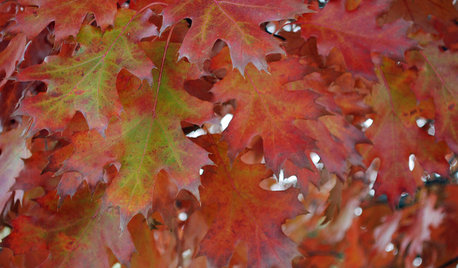Powdery mildew on leaves
jerryung
15 years ago
Related Stories

GARDENING GUIDES6 Healthy Ways to Handle Fallen Leaves
Once nature's beautiful bounty is spent, these ecofriendly strategies for leaves will put your yard in the clear
Full Story
LAUNDRY ROOMSRoom of the Day: The Laundry Room No One Wants to Leave
The Hardworking Home: Ocean views, vaulted ceilings and extensive counter and storage space make this hub a joy to work in
Full Story
MONTHLY HOME CHECKLISTSAugust Checklist for a Smooth-Running Home
Sniff out mildew, ramp up home security and get down to other tasks before summer is over and out
Full Story
OUTDOOR ACCESSORIESCare Guide: How to Clean Your Patio Cushions
Ready your furniture for spring and summer with these tips for removing sunscreen stains, mildew and more
Full Story
UPHOLSTERYFabric Focus: There's Nothing Quite Like Linen
Classic, understated, durable and mildew-resistant, linen is a casual fabric fit for any home
Full Story
DECORATING GUIDESDecorate With Intention: Unbury Your Treasures
Love letters languishing in a box? Memories getting mildewed? Give them pride of place on your walls for more meaningful decor in your home
Full Story
MOST POPULAR11 Nominees for the ‘She Shed’ Hall of Fame
These special sanctuaries let busy women get away from it all without leaving the backyard
Full Story
HOUSEKEEPINGQuick Fix: How to Patch a Drywall Hole
Dents and dings disappear, leaving your walls looking brand new, with this fix that even a novice can do
Full Story
GARDENING AND LANDSCAPINGPool-Friendly Patio Materials
Get a pool patio to match your style at a price that doesn't leave you high and dry
Full Story
GARDENING GUIDESGreat Design Plant: Rosa Banksiae a Low-Maintenance Beauty
This thornless, disease- and insect-resistant rose brings showers of white or yellow flowers to the spring garden
Full StorySponsored






organic_mamag
jerryungOriginal Author
Related Professionals
Allen Landscape Architects & Landscape Designers · Surprise Landscape Architects & Landscape Designers · Suffern Landscape Architects & Landscape Designers · Wareham Landscape Architects & Landscape Designers · Chelmsford Landscape Contractors · Hoover Landscape Contractors · Mastic Beach Landscape Contractors · Muttontown Landscape Contractors · North Potomac Landscape Contractors · Eastlake Landscape Contractors · Casselberry Landscape Contractors · Huntsville Roofing & Gutters · Roswell Roofing & Gutters · Lake Forest Roofing & Gutters · Hull Roofing & Guttersmarci229
elwood45
halfmast56
jerryungOriginal Author
magickiwi
susanne_in_nl